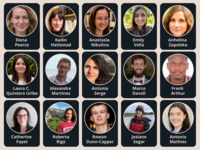Integrated Landscape Analysis (ILA): Addressing the biodiversity and climate crises
Status | Location | Course Dates | Target group | Maximum number of participants / Credit Points |
Online/MOOC | individual access | Doctoral researchers | individual / 1.0 CP |
Contents
Join the Free Online Course in Landscape Management!
Integrated Landscape Analysis - Addressing the Biodiversity and Climate Crises
Learn how to mitigate and reverse the effects of landscape degradation. Discover sustainable landscape management, including rewilding initiatives that can help promote biodiversity and restore Europe's stunning landscapes.
Developed with the help of the Terranova Consortium, this free course will take you on a journey through the history and development of landscapes, the challenges we face today, and the steps needed to create a sustainable landscape for the future.
Enroll now and explore the six chapters of the course:
Chapter 1 - Introduction to Landscapes
Chapter 2 - Learning from the Past
Chapter 3 - Models in Landscape Context
Chapter 4 - Challenges in Landscape Management
Chapter 5 - Looking forward
Chapter 6 - Conclusions
The course offers over 15 downloadable landscape management presentation templates and an extensive collection of references to articles and resources covering a wide range of related topics.
Each of the six chapters of the course takes approximately 3-5 hours to complete. The entire course takes between 18-30 hours to complete - depending on your familiarity with the subjects. At the end you'll get a certificate of completion of the course. Send us your certificate if you want to add it to your yDiv curriculum (1 CP).
Lecturers

This MOOC (Massive Open Online Course) was created by fifteen PhD candidates from leading Universities around Europe specializing in landscape histories and futures. Thanks to TerraNova, the European Landscape Learning Initiative, these researchers were able to develop a unique course focused on analyzing landscapes throughout the past, present, and future.
